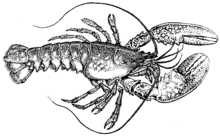The Crabfish
| "The Crabfish" | |
|---|---|
 | |
| Song | |
| Language | English |
| Published | c. 1620 |
| Songwriter(s) | Traditional |
"The Crabfish" is a ribald humorous folk song of the English oral tradition. It dates back to the seventeenth century, appearing in Bishop Percy's Folio Manuscript as a song named "The Sea Crabb" based on an earlier tale.[1] The moral of the story is that one should look in the chamber pot before using it.
Owing to the indelicate nature of its theme this ballad was intentionally excluded from Francis James Child's renowned compilation of folk songs The English and Scottish Popular Ballads.[2] The song has a Roud Folk Song Index of 149. It is also known as "The Crayfish".
Synopsis
A man brings a crabfish (most likely a common lobster) home as a gift for his wife and puts it in the chamber pot. Some time in the night his wife answers a call of nature and the crustacean grabs her private parts. In the ensuing scuffle the husband gets bitten too.[3]
Text
Fisherman, fisherman, standing by the sea
Have you got a crayfish that you can sell to me
By the way side high diddly aye do
Yes sir, yes sir, that indeed I do
I have got a crayfish that I can sell to you
By the way side high diddly aye do
Well, I took the crayfish home, and I thought he'd like a swim
So I filled up the chamber pot, and I threw the bugger in
By the way side high diddly aye do
In the middle of the night, I thought I'd have a fit
When my old lady got up to a-have a shit
By the way side high diddly aye do
Husband, husband, she cried out to me
The devil's in the chamber pot, and he's got hold of me
By the way side high diddly aye do
Children, children, bring the looking glass
Come and see the crayfish that bit your mother's arse
By the way side high diddly aye do
Children, children, did you hear the grunt
Come and see the crayfish that bit your mother's cunt
By the way side high diddly aye do
It's the ending of me story; I don't have any more
I've an apple in me pocket, and you can have the core
By the way side high diddly aye do
Variants
"Johnny Daddlum" is the Irish version of this song.[4] There are variants in which the coarse language is more clear-cut than in others. In some variants the wife is pregnant, having previously told her husband about her craving to eat crabfish meat.
This song has also variants under other names such as "Old She-Crab," "The Crayfish," "A Combat Between an Ale-Wife and a Sea Crab," "The Fishy Crab," and "The Lobster."[5][6][7][8]
Versions
A sanitised version of "The Crabfish," expunging the straightforwardness of the original in order to make the song available for child audiences, was released in recent[when?] years.[9] Instead of private parts the crabfish grabs the wife by the "face" and "nose".[10]
References
- ^ Frederick J. Furnivall, ed. (1867). Bishop Percy's Folio Manuscript: loose and humorous songs. London. p. 100.
{{cite book}}: CS1 maint: location missing publisher (link) - ^ Lyr Req: Mr Radalum? / Raddle-um / Crabfish etc.
- ^ "The Crabfish". Retrieved 24 January 2016.
- ^ Johnny Daddlum
- ^ Old She-Crab
- ^ The Crayfish
- ^ A Combat Between an Ale-Wife and a Sea Crab
- ^ "Lobster Song". Retrieved 24 January 2016.
- ^ "The Crabfish". Retrieved 24 January 2016.
- ^ "Folk & Traditional Song Lyrics - The Crayfish". www.traditionalmusic.co.uk.
External links
- Salty Dick's Uncensored Sailor Songs, "The Crabfish", archived from the original on 2012-12-11, retrieved 2014-06-08
- Dan and Bonnie Milner sing "The Crabfish" at the 2009 Chicago Maritime Festival
- Tom Chapin sings "The Crabfish Song" (children version)
